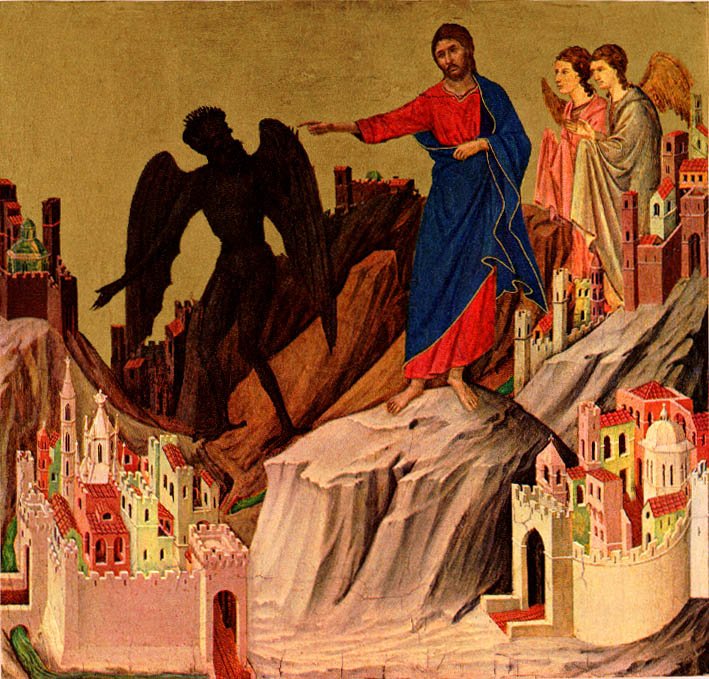The temptation of omnipotence
Jesus did not succumb to temptation, but he can only be near us by having himself been tempted.
 When they recite the Creed, Christians profess their faith that Jesus was both God and man – this is the essence of the mystery of the Incarnation. But if he were wholly man, Jesus knew the struggle against that part of himself, the desire for omnipotence which draws its strength from urges, and whose stake is the freedom of an individual. Certainly, Jesus did not succumb to temptation, but he can only be near us by having himself been tempted.
When they recite the Creed, Christians profess their faith that Jesus was both God and man – this is the essence of the mystery of the Incarnation. But if he were wholly man, Jesus knew the struggle against that part of himself, the desire for omnipotence which draws its strength from urges, and whose stake is the freedom of an individual. Certainly, Jesus did not succumb to temptation, but he can only be near us by having himself been tempted.
From the first sentence of this Sunday's Gospel, Matthew distinguishes the Spirit (which Jesus had just received in the river Jordan) from the devil. The Spirit - this is the meaning of baptism – gives birth, it participates in creation (see Genesis); it allows an individual to be born to himself, to form a unity, to become a subject.The devil is, on the other hand, the one who divides. He subjects (and reduces) the individual to his impulses to the extent that he is no longer fully acting as a subject or agent. Psychology teaches us that urges divide the individual. The devil is the one who draws the individual into a deconstruction of himself as a subject.Given that Jesus’ temptation in the desert came immediately after his baptism, one might ask whether the “forty days and forty nights” are not part of one and the same movement. Do they not symbolically represent, with baptism, a “birth” in a dynamic, that of Jesus “son of God”?A “birth” right until the cross, until he knows a final temptation (“My Father, if it is possible, may this cup be taken from me”, Matthew 26:39)? A “birth” as a succession of temptations until his death and resurrection?In Gethsemane, before his arrest, Jesus told his disciples, “Watch and pray so that you may not fall into the power of temptation” (Mt 26:41). During his life, would not Jesus' confrontation with reality, with its series of temptations, constitute his “birth” as the “son of God”? It would be one way of understanding the text by emphasizing that it is in the midst of the tests that the Spirit allows a man to become a man, whoever he may be, and thus to be born to himself. The “forty days and forty nights” recall the crossing of the desert by the Israelites in search of a homeland, an identity, a birth.
The power of Jesus' story is that of a man who is free from his destiny. Despite appeals and pressure, he does not organize a rebellion against the Roman occupation. He always refuses to place himself in a position of omnipotence, in that of an image of an Almighty God. Throughout his ministry, Jesus serves others, the wounded man. He puts him back on his feet by giving him back his freedom without ever substituting himself for him. He puts himself, through him, at the service of a God whom he will call the Father.
The first temptation: Jesus refuses to be self-sufficient. What feeds him is other people. What constitutes a man is to accept being dependent — without submission — on others, on their wishes.The second tJesus refuses to take power over others. What makes a man is the fact of making others free.The third temptation: Jesus refuses to take the others hostage. He does not tell others what to do. He does appropriate them. What constitutes a man is respect for others.Matthew shows that, like Jesus, despite the desire for omnipotence, man can be born to himself. His story is one of birth. The baptism he received inscribes him in the word of a God who begets him every day with a respect for his otherness and invites him to become “the son of God". He invites him to be carried away by His word, to trust in His promise. To experience the faith in the other (the Other).In this world in search of meaning, yet in love with freedom, it is important that the Church does not place itself in a position of omnipotence within society, of authority, which, by substituting itself for individuals, knows in advance what to do or not to do, to think or not to think.On the contrary, an understanding of the sacrament of baptism comes through a humble Church which, like Christ on the road to Emmaus, listens to him, understands his suffering, questions with him the meaning of life, opens him up to a time of hope and, thus, allows him to become subject of his history.


 Votes : 0
Votes : 0









